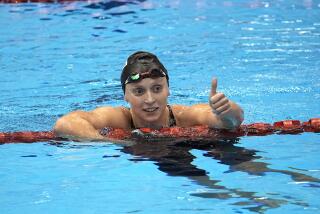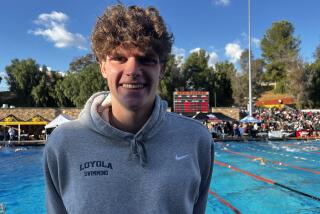London Olympics: Michael Phelps goes out as he came in — on top
LONDON — It is not the American way for an athlete to bid farewell from the top of the mountain. There is always one more season, one more challenge, one more contract.
Willie Mays stumbled infamously around center field. Brett Favre made a mockery of the word “retirement.” Shaquille O’Neal morphed into The Big Bit Player.
Michael Phelps did it his way, this way: Gold. Gold. Gold. Gold. Gone.
“I did everything I wanted to,” he said. “If you can say that about your career, there is no need to move forward.”
The final session of the Olympic swimming competition turned into a Saturday night farewell party for the 27-year-old Phelps. The public address announcer primed the crowd thusly: “Are you ready to see the last race of a certain Michael Phelps?”
No matter that the race was a medley relay, with 31 other swimmers competing. The United States won, with Phelps chasing down the Japanese team to put the Americans ahead for good. After the race, swimmers from other nations lined up to shake his hand.
FINA, the international governing body for swimming, presented him with a silver trophy inscribed with these words: “The Greatest Olympic Athlete of All Time.”
In Beijing, he won a record eight gold medals. In London, he became the first male swimmer to win the same event in three consecutive events — and he did it twice, on Thursday in the 200-meter individual medley, again on Friday in the 100 butterfly.
His Olympic records — 22 total medals, 18 gold medals — might never be broken.
“I’ve looked up to Michael Jordan my whole life, because he has done something that nobody else has ever done,” Phelps said. “He is the greatest basketball player ever to play the game.
“I have been able to become the best swimmer of all time.”
The U.S. capped a dominant week in the pool with victories in the two medley relays Saturday. The women’s team — Missy Franklin, Rebecca Soni, Dana Vollmer and Allison Schmitt — set a world record in its victory.
After winning two gold medals in Beijing, the U.S. women won eight here. The men also won eight, and the total of 16 was the most for the Americans since 1984, when the Soviet-led boycott weakened the field in Los Angeles.
The U.S. collected 30 swimming medals in all, one shy of the total from Beijing but almost three times more than any other country. Japan won 11, followed by Australia and China with 10 apiece.
With Phelps, amid the history, there was a humanity that emerged.
In 2008, the quest to go eight for eight bordered on obsession. Perfection was required. The journey was a solo one. The slightest wrinkle could end the dream. He scarcely said a word to his teammates.
“Back then, the only perspective was performance,” said his longtime coach, Bob Bowman. “It was really just focusing on every detail we could. He didn’t have an appreciation for the bigger picture of what he was doing, or anything else that was going on around him.”
This time, Phelps did not sit silently in team meetings. He told stories, enjoyed the rookie skits in training camp, encouraged teammates during practice and dropped by to wish them good luck before their races. He cried on the medal podium, and after he warmed down from his final race.
He heard and saw what he had meant to the rest of the world — to Chad le Clos, a 20-year-old South African who grew up aspiring to race just once against the mighty Phelps; to Evgeny Korotyshkin, a Russian who called Phelps “an idol for all swimmers” despite the misfortune of swimming against him in three consecutive Olympics; to Kosuke Kitajima of Japan, a four-time gold medalist.
“I’m nothing compared to Michael,” Kitajima said. “It was a wonderful experience for me that we were able to swim together in that last relay.”
Franklin is the heir apparent to Phelps as America’s marquee swim star. She won five medals here, at 17, an age at which Phelps had none. Yet she had no illusions, teenage or otherwise, about replacing Phelps.
“I don’t think his shoes will ever be filled,” Franklin said. “Hopefully, I can make small little paths next to him.”
Retirement looked like a wise decision on the first night here, when Phelps failed to medal in the 400 individual medley. But two silver medals followed, and then gold in each of his last four events.
No other swimmer won six medals here. If Phelps wanted to keep swimming, Bowman said, he could make the Olympic team in 2016, and again in 2020.
So it was little wonder that, as Phelps left the interview room, the first question to his teammates was whether they believed he really would retire.
“Yes,” Phelps shouted from a backstage hallway, as he walked into retirement.
twitter.com/BillShaikin
More to Read
Go beyond the scoreboard
Get the latest on L.A.'s teams in the daily Sports Report newsletter.
You may occasionally receive promotional content from the Los Angeles Times.







